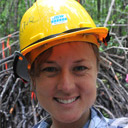LIMA, Peru—Unclear land tenure and political instability are the biggest challenges faced by a REDD+ initiative in Brazil’s Amapá state, according to the project’s proponents.
Rebeca Lima is from Biofílica, a Brazilian company that invests in REDD+ and other forest conservation projects in Brazil, and works on the Jari/Amapá REDD+ Initiative, run in partnership a corporate group, Grupo Jari.
The initiative—analyzed by the Center for International Forestry Research (CIFOR) in a new book—is working with smallholders to develop more efficient land use practices and reduce deforestation.
“Our biggest challenge is land tenure clarification,” Rebeca Lima said, on the sidelines of the recent UN climate change meeting in Peru. “It’s not only a problem we only have in Amapá but is an Amazon-wide issue.”
“If land tenure’s not clear, we can’t distribute the benefits from the forest fairly—and without it, smallholders aren’t able to access rural credits.”
Another significant problem is political instability, she said
“Every time we have elections we have to build everything from the beginning again because people that are in charge of the policies change, and we lose everything,” she said.
Lima says from her perspective on the ground, it is crucial for international negotiators come to an agreement soon about the future of REDD+.
“I think sometimes politicians don’t see the importance their decisions have for us,” she said.
“If they can come to an agreement, this will give us a level of motivation that they can’t imagine. People—and not just me, but all the farmers I work with, NGOs, people working on the ground—will have the highest level of motivation that we have ever had, and it will allow us to move forward and do more even than is expected of us.”
Lima would also like to see more cooperation and solidarity between project developers.
“We are working together for the same cause—so we need to exchange experience, capacity building or technology transference, and help each other.”
“Sometimes we expect rich countries to give us all the technology and knowledge—but we are already building these ourselves, yet we’re not talking with each other.
“So I’m asking for a little bit of south-south cooperation within the project developers of REDD+.”
For more information about the topics of this research, contact William Sunderlin at w.sunderlin@cgiar.org.
CIFOR’s Global Comparative Study on REDD+ is supported in part by the CGIAR Research Program on Forests, Trees and Agroforestry and by NORAD, AusAID, DFID and the European Commission.
We want you to share Forests News content, which is licensed under Creative Commons Attribution-NonCommercial-ShareAlike 4.0 International (CC BY-NC-SA 4.0). This means you are free to redistribute our material for non-commercial purposes. All we ask is that you give Forests News appropriate credit and link to the original Forests News content, indicate if changes were made, and distribute your contributions under the same Creative Commons license. You must notify Forests News if you repost, reprint or reuse our materials by contacting forestsnews@cifor-icraf.org.














